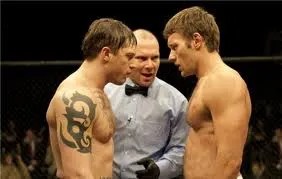 Brendan (Joel Edgerton) is in trouble. Between them, he and his wife are holding down three jobs in an effort to stay afloat, but the bank are going to foreclose on his mortgage in 90 days unless he can come up with serious cash. He refuses to allow this to happen and so gets back into the MMA fighting he dabbled with a few years back, in an effort to bring in a bit more money. Meanwhile, Brendan’s brother Tommy (Tom Hardy) is back from serving overseas in the armed forces and tracks down their father (Nick Nolte), a reformed alcoholic and wife-beater, to ask him to train him for Sparta, an upcoming MMA winner takes all tournament, with a pot worth m. Brendan finds himself qualifying for the tournament as well, setting the estranged brothers on a literal and metaphorical collision course.
Brendan (Joel Edgerton) is in trouble. Between them, he and his wife are holding down three jobs in an effort to stay afloat, but the bank are going to foreclose on his mortgage in 90 days unless he can come up with serious cash. He refuses to allow this to happen and so gets back into the MMA fighting he dabbled with a few years back, in an effort to bring in a bit more money. Meanwhile, Brendan’s brother Tommy (Tom Hardy) is back from serving overseas in the armed forces and tracks down their father (Nick Nolte), a reformed alcoholic and wife-beater, to ask him to train him for Sparta, an upcoming MMA winner takes all tournament, with a pot worth m. Brendan finds himself qualifying for the tournament as well, setting the estranged brothers on a literal and metaphorical collision course.
*****
Despite being very well received on its theatrical release (it currently sits at 139 in the admittedly unpredictable IMDb Top 250), Warrior came and went pretty quickly, perhaps being unjustly perceived as another fighting film, a poor cousin to Rocky and The Fighter. In fact, somewhat contrived as the outcome might be, this is a sensationally affecting and thematically weighty film, fully deserving of finding as wide an audience as possible on the small screen.
Edgerton and Hardy give us archetypes in the principal roles, without ever slipping into caricature or stereotype. Brendan is by far the more technically accomplished fighter, relying on submission moves rather than brute force, whereas Tommy is an absolute hulk of a man, his thick-set shoulders pulling him forward into a hunch that communicates his smouldering anger just as much as the words he spits out at his brother and father. It is the classic brawler versus fighter match up and all the more thrilling for it, Tommy dispatching people in a barrage of blows, whilst Brendan works his opponents on the ground, trying to get them to tap out.


Although the film tests the buttocks a little with its 2h20min running time, it is never less than completely engaging and the quieter moments, whether between Tommy and his father, or Brendan and his wife, are vital in giving the characters heft and depth. Without these beats, we would not care how the tournament ends; it is vital to our investment in the story. Although the overall arc of the story is predictable, it is a thoroughly well-written film, putting believable lines in the mouths of fully-formed characters. A mixture of actors trained to fight and fighters trained to act gives the film its desired (and essential) verisimilitude and the progression of each character is believable.
In relation to earlier allusions as to thematic heft, the film covers a lot of ground – guilt, pride, forgiveness, repentance, shame, fraternal conflict, reconciliation – and these weighty matters are all given room without bogging the film down in worthiness. No easy answers are offered for the psychological damage inflicted by these men on each other, but the outcome gives us hope for them and for ourselves, without lapsing into mawkish sentimentality.
For this reviewer’s money, a better film than The Fighter and definitely more affecting, even without the benefit of a “based on a true story” tag. The acting is much more dialled down than the Oscar-winning histrionics of David O. Russell’s film and is therefore more compelling, less showy and ultimately more impressive. An absolute must if you missed it on the big screen and well worth revisiting even if you didn’t.
[Rating:5/5]
Extras: An abundant package, well worth sitting through and lovingly constructed with a welcome absence of repetition:-
- Making Of Documentary
- Deleted Scene
- Gag Reel
- Storyboard comparison for the final fight scene, including rehearsals with stunt doubles
- MMA Strategy – Philosophy in Combat – One of the technical consultants on the film discusses his own philosophical approach to MMA
- Tribute to Charles “Mask” Lewis Jr, who provided invaluable support to director Gavin O’Connor during pre-production, but who sadly passed away before the film began shooting
- Feature-length Enhanced Viewing Mode – a screen-in-screen analysis of the film, with director (and co-writer) Gavin O’Connor looking at various sequences with his co-writer, editor, actors, stunt players, MMA consultants, composer and sound editors – an excellent dissection of the various elements that go into the making of the film, considering set-building, casting, training, veracity and honest self-evaluation
- Commentary with Gavin O’Connor, Joel Edgerton, editor John Gilroy and co-writer Anthony Tambakis – this overlaps with the Enhanced Viewing Mode at times and suffers a little from not being screen-in-screen, but still has valuable information about turning a gravel car-lot in Pittsburgh into the Iraq desert and putting the actors through rigorous training. O’Connor in particular is self-effacing and candid, but still rightly proud of what he has achieved.
All in all, a really strong package.
[Rating:4/5]
[yframe url=’http://www.youtube.com/watch?v=kY7HcUACs58′]








